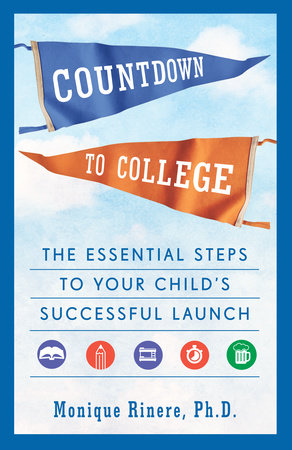5 Tips for Parents About To Send Their Kids Off to College
by Monique Rinere
After more than two decades of advising college students — and their parents — on the journey from move-in to graduation and beyond, I’ve come up with the top five pieces of advice I’ve given over and over again. Whether your child is going off to live at a residential college or commuting from home, these are five simple but important steps you can take to help your child succeed and give yourself peace of mind to boot.
1. Know who to call.
You know your child better than anyone else on the planet. So, when your gut tells you something worrisome is going on, you need to know the right campus contact. Many parents of residential college students call the Resident Advisor first. That’s a big no-no. RA’s are students too, and their goal is to help your child acclimate and find their place — not to soothe parents’ nerves or address parental concerns. Most colleges now have something like a Parent and Family Office that welcomes inquiries. If not, every college has a 24/7 on-call crisis management system in place, led by a Dean of Students or VP of Student Affairs. Find their name and contact information, and reach out to them if you feel that something’s just not right with your kid. They’ll be able to direct your inquiry in the most expedient way.
2. Urge your child to get to know faculty.
Research shows time and again that students who have solid connections to faculty have a much better college experience than those who don’t — and they’re more likely to graduate on time! The thought of visiting a professor during office hours often strikes fear in the hearts of even the most intrepid 18-year-olds, but there are many reasons it’s a good idea, and it’s actually relatively simple. Encourage your child to forge those relationships from the get-go, and remind them to show up on time, dress appropriately, silence their phone, and take notes.
3. Connections, connections, connections.
With 80% of jobs lurking on the so-called “hidden job market,” and 80% of hires happening through connections, students need to talk to people in the fields that interest them from early on in their college years. The best tool to expand their network is informational interviewing, a simple chat over coffee with someone who’s had some measure of success in professional life — to learn how they did it, what they love and don’t love about it, and what advice they have for someone just starting out. Anything you can do to connect them to people will help. Parents often say to me, “But I don’t know anyone in that field.” Chances are that someone you know knows someone who knows someone. I recently helped a college professor connect his kid to a real estate agent — an interest of his son’s — through the friend of a friend. Luckily, people generally like to talk about themselves, so when you ask someone to coffee to hear the story of their success, most say yes!
4. Encourage your child to do a gap year.
Parents often look at me in horror when I suggest this, but there’s nothing like a year between high school and college to give young people a chance to catch their breath and recover from coursework, extracurriculars, standardized testing, volunteer work, jobs, and the inevitable high school drama. On move-in day, I can spot a freshman who’s taken a year off from across the room. They’re much more relaxed, mature, and self-confident. They’ve also had time to think about what’s important to them, which can bring greater focus to their academic work and personal lives, and they tend to make better choices about alcohol, drugs, sex, and relationships. They just have a better perspective all around. I don’t think there’s a single downside to it!
5. Know the total degree cost — from tuition and fees to room and board, and everything in between.
I’ve watched hundreds of families go into extraordinary debt to get a child across the stage. The student debt crisis is real. I urge families to spend only what they can afford. Try to resist the siren call of the private schools that can’t meet your full financial-aid needs. State and city colleges are chock-full of brilliant professors and awesome students, so no one needs to go into mountains of crushing debt to get a good education in this country.
-
Get the Book:
-
Countdown to College: The Essential Steps to Your Child's Successful Launch
Available from:Also available from:

